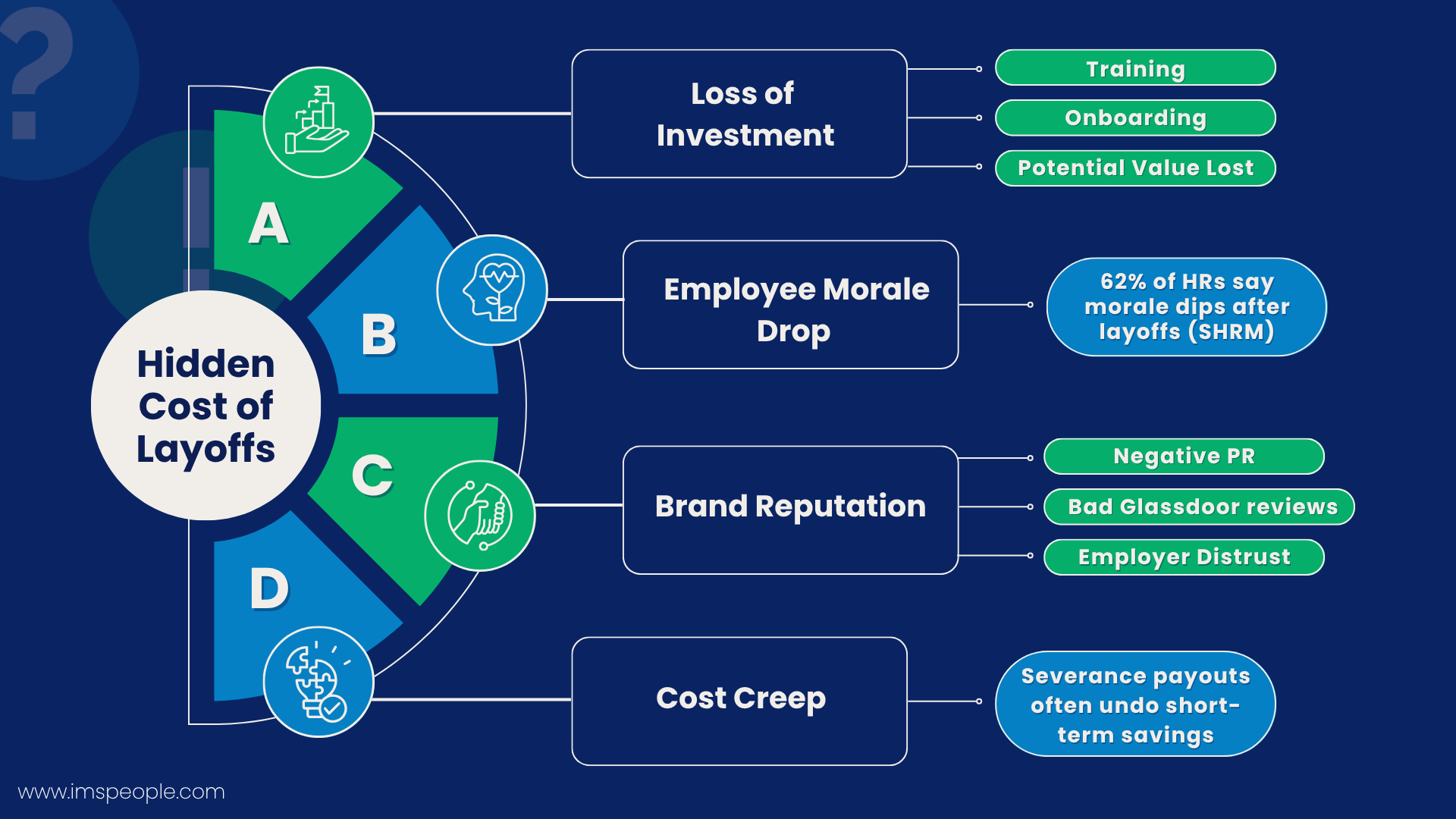According to data from Randstad RiseMart, in 2023, 96% of business organisations downsized in one way or another.
In the post-COVID business world, layoffs have adopted a predictable pattern. Any signs of economic slowdown, financial distress, or strategic shifts often trigger significant and small-scale layoffs by companies.
However, compared to the short-term benefits, layoffs come with significant disadvantages for a company in the long run. On the other hand, offshore recruitment offers scalability and flexibility while delivering the same level of performance as the in-house team. So, businesses can explore offshore RPO services whenever they want to expand their team to avoid future downscaling scenarios.
This blog will cover the disadvantages of layoffs and compare them with the benefits of offshoring for businesses.
Impact of layoffs – the productivity pitfall

If your company is burdened with low demand and a high number of employees, laying off becomes the hard truth. Although it may appear like a simple way to save money, layoffs can have hidden costs that a company bears in the long term. The consequences of this have more profound impacts on your company than are initially visible.
Some of the immediate affects you can observe are the impact on your brand image as disgruntled employees would spread negative information about your business. This can tarnish your reputation as an employer and affect future hiring.
Additionally, the cost saved from laying off an employee is quickly undone from the costs incurred as severance packages.
Here are the other negative impacts of layoffs:
Loss of investment potential
Hiring any employee is an investment that requires spending time, money, resources, training, and education on those who could eventually provide excellent value to the company.
When you lay off, you waste the potential of the investments you have already made – and might need again in the future.
Loss of trust in the company
Layoffs can weaken the remaining employees’ confidence and their trust in your company, negatively impacting their work, motivation, and overall performance.

(Source: University of Warwick)
Feeling like an expendable resource, your employees might feel reluctant to go above and beyond, unable to trust the job security that kept them going.
Another study by the Society for Human Resource Management reveals that 62% of HR professionals admitted to a negative impact on the morale of the remaining employees due to layoffs. (Source: ResearchGate)
Tarnished brand image
Layoffs can invite unwanted media trials and harm your employer’s branding among socially responsible stakeholders, investors, and potential employees.
Layoffs are viewed as a sign of instability and unreliability, and they can pose future talent acquisition challenges for your company.
Scalable workforce management with RPOs
As we mentioned earlier, offshore recruitment services provide better scope than hiring new resources or when a company’s resource needs fluctuate. If a company finds it challenging to maintain an internal team over the long term, it is advisable to outsource its various needs to an offshore RPO services provider.
Flexible Resource Management
With RPOs onboard, companies can acquire resources based on their short-term or long-term requirements and strategic plans.
This will allow for scalability and flexibility in workforce management without resorting to layoffs.
As per Ciklum, Offshoring can allow companies to access specialized expertise or scale up/down operations quickly, improving efficiency and potentially avoiding layoffs during downturns.

(Source: NBER)
Cost Savings
You can save on traditional hiring costs by outsourcing the recruitment process to an RPO partner.
Your Offshore Recruitment partner can provide cost-effective solutions customised for your company’s specific needs and save significant hiring costs over time.
Access to Skilled Professionals
Offshore RPO services providers can leverage their expertise to attract and recruit skilled professionals across various industries and job roles.
This ensures that your company has access to a pool of qualified candidates who can contribute to its success as per its needs.
The McKinsey Global Institute suggests that offshoring can enhance a company’s competitiveness by allowing it to focus on core competencies while leveraging the expertise and cost advantages of offshore partners.
By partnering with an offshore recruitment partner, you can avoid the disadvantages associated with layoffs, maintain a positive brand image, and ensure access to skilled professionals as per their requirements.
Best practices of Offshoring
Offshore recruitment services can be a great way to access talent, reduce costs, and expand your business reach, but it is important to do it right. Here are some best practices to consider:
- Before you offshore
- Define your goals and expectations
- Evaluate your internal processes
- Identify suitable tasks
- Consider location
- Research potential providers
- During the offshoring process:
- Choose the right partner
- Develop a clear scope of work
- Establish strong communication
- Invest in training and knowledge transfer
- Monitor performance and adapt
- Additional best practices:
- Focus on building relationships
- Manage cultural differences
- Emphasize security
- Consider legal and regulatory issues
- Prepare your onshore team
Remember, offshoring is a strategic decision that requires careful planning and execution. By following these best practices, you can increase your chances of success and leverage the many benefits that offshore recruitment services can offer.
Conclusion – Turning the tide on economic uncertainty
IMS People Possible can be your reliable offshore RPO services partner dedicated to supporting your long-term success and can help you confidently navigate periods of economic uncertainty.
With 18+ years of experience providing end-to-end offshore recruitment services to varied industries, you do not have to worry about downsizing being troublesome and layoffs harming your business.
Contact us today to find recruitment solutions for your business!







